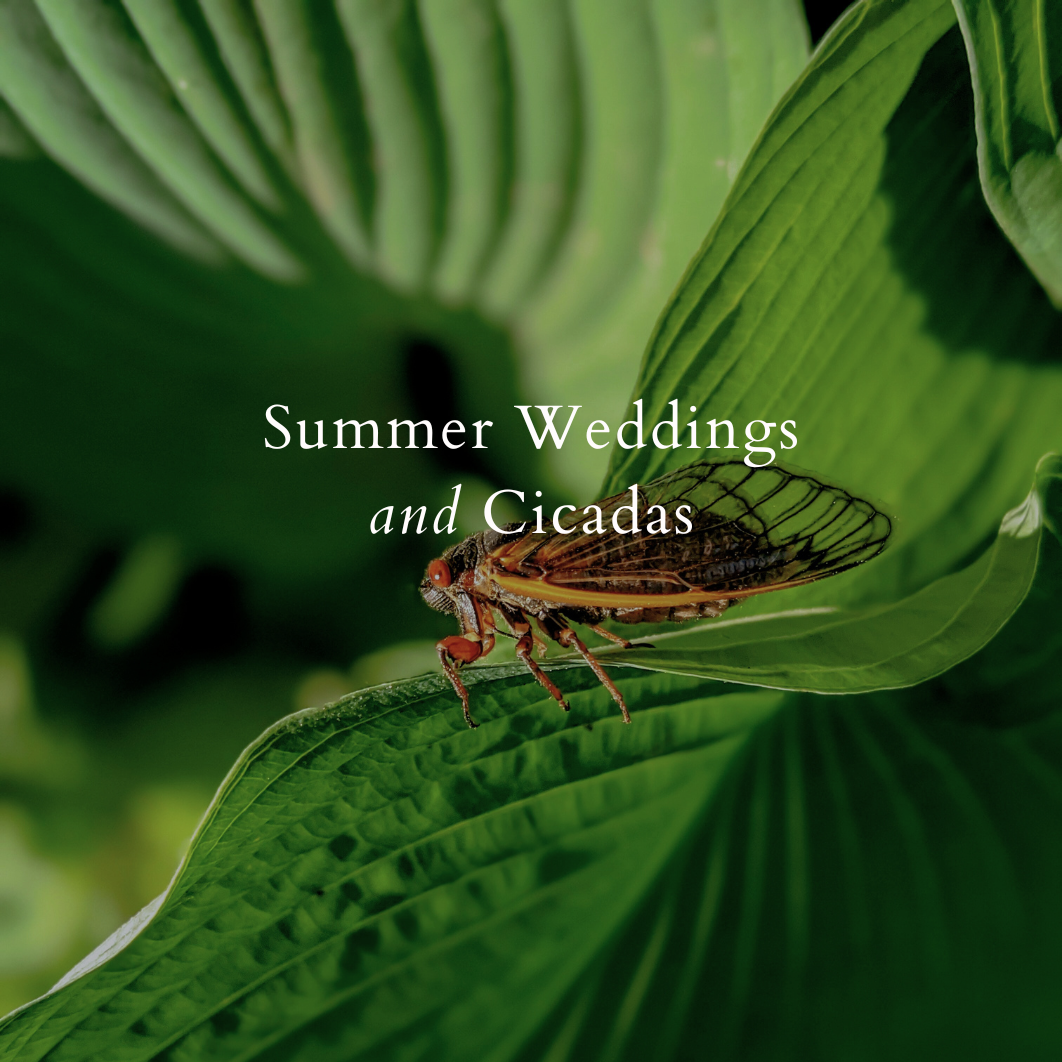While outside in my backyard this week, I noticed the tell-tale signs that Brood XIX is emerging: brown exoskeletons clinging to tree bark with dime-sized holes in the ground close by. The last time this amount of cicadas happened, Ella was in fifth grade and I was in seventh. I remember spending hours that summer searching for a rare blue-eyed cicada in hopes of making a few thousand dollars if we sold it to researchers. Unbeknownst to us, that was a rumor probably started by parents who wanted to keep their kids preoccupied outside.
Thirteen years later, we’re still intrigued by the cicada phenomenon, but now with a wedding professional’s lens. Couples with upcoming outdoor ceremonies or receptions may find themselves grappling with questions like, “Will the loud buzzing disrupt our vows?” or “Are cicadas going to land on me in my wedding dress?” While they may seem a bit trivial, they’re valid concerns! Let’s get into what to expect and how to navigate cicadas on your wedding day in Nashville.
How Loud Will the Cicadas Be This Summer?
Cicadas are pretty loud every summer here in Nashville, but this summer will be the loudest by far since 2011! On average, male cicadas produce sounds ranging from around 80 to 100 decibels, which is comparable to the noise level of a lawnmower or a chainsaw. Multiply that by millions, and the sound can feel deafening – especially near the woods.
I always thought their sound came from their mouths, but it’s produced in a far more creative way. Here’s how Derke Hughes, a researcher at the Naval Undersea Warfare Center explains it:
“If your body were like that of a cicada, he explained, you would have a thick set of muscles on either side of your torso that would allow you to cave in your chest so far that all your ribs would buckle inward one at a time into a deformed position. Releasing the muscle would allow your ribs to snap back to their regular shape and then pulling the muscle again would repeat this. The cicada repeats this cycle for its left and right sides about 300 to 400 times a second.”
After living underground for thirteen years, they will spend their last four weeks of life making loud noise and mating. Then, their offspring will repeat the process!

Make Sure You Have a Sound System
To ensure people can clearly hear your vows, make sure you have a sound system and strategically placed speakers. This will help minimize the impact of the cicadas’ noises during your wedding.
Avoid the Trees
If you are able, try to make sure your ceremony space is as far from trees as possible. The fewer trees there are, the less likely cicadas will heavily populate your ceremony. If possible, consider moving your outdoor ceremony to an indoor space.
The Weather Makes a Difference
Cicadas are most active during the hottest parts of the day, so mornings and evenings may be quieter depending on the weather. This means that if your wedding is scheduled towards the end of the day, your ceremony should be a bit quieter than if it were held midafternoon.
Consider Providing Ear Plugs
If you’d like to go the extra mile, consider providing ear plugs for your guests. The classic foam earplugs will work just fine, but my favorite kind is from Loops Earplugs! Another option is to let your guests know via your wedding website about the cicada emergence and encourage them to come prepared.
Embrace the Cicada Experience!
This only happens a few times in a lifetime, and it’ll certainly be a part of your memory whenever you think back to your wedding day! If insects don’t totally freak you out, ask your photographer to take a photo of you and your spouse holding a cicada. If that’s maybe a step too far, maybe just have your photographer take a photo of a cicada at your venue to document the full experience.
Also, try to stay calm when a cicada inevitably lands on you. They’re clumsy fliers but they’re harmless to both people and pets. (Thankfully, they don’t bite, sting, or lay eggs on people!)
A Note On Cicadas and Flowers
Great news! Cicadas get their nutrients from sap, not flowers or leaves, so they won’t cause damage to your floral arrangements.
If you’re ready to check wedding flowers off of your list, inquire with us to get started. For our favorite summer flowers, check out this post!

